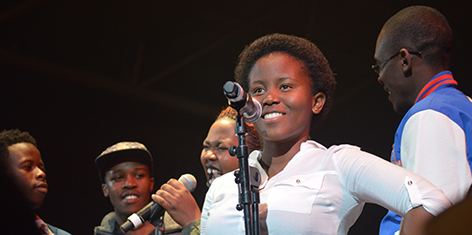Latest News Archive
Please select Category, Year, and then Month to display items
11 January 2021
|
Story André Damons
|
Photo Supplied
 Dr Ralph Clark
Dr Ralph Clark
The Afromontane Research Unit (ARU), the flagship research group of the University of the Free State (UFS) Qwaqwa Campus, has recently been granted R8,4 million to establish a Risk and Vulnerability Science Centre programme.
The Risk and Vulnerability Science Centre (RVSC) programme was established by the Department of Science and Innovation (DSI) as part of the Global Change Research Plan for South Africa and is funded by the DSI through the National Research Foundation (NRF). The RVSC will focus on the need to generate and disseminate knowledge about risk and vulnerability on global change challenges faced by local policy makers/ governance structures and communities in South Africa.
Invited to participate
Dr Ralph Clark, Director of the ARU, says the UFS, together with the University of Zululand and the Sol Plaatje University, has been invited to participate in Phase 2 of the RVSC programme. Dr Clark was approached by the DSI (on referral from the South African Environmental Observation Network – SAEON) in February 2020 regarding the potential for establishing a RVSC at the UFS Qwaqwa campus.
Subsequent interactions were held between the UFS and DSI, and in March 2020, the UFS formally accepted the DSI invitation. It has since been agreed that the RVSC: UFS will be hosted as a RVSC under the ARU umbrella, with dedicated personnel embedded at the UFS in this regard (internal processes and reporting) but reporting directly to the NRF regarding the RVSC.
Interest and support welcomed
Dr Clark welcomed this interest and support from the DSI-NRF, saying that the funds will further assist the UFS in growing its excellent and growing research portfolio and building more research capacity on this traditionally undergraduate-focused campus. “The RVSC will contribute to much-needed solutions in an area marked by major sustainability challenges and will assist in moving Phuthaditjhaba away from its negative apartheid history towards becoming a sustainable African mountain city,” says Dr Clark.
I-DENT-I-TIES tackles identity in an unusual story-telling style
2016-07-26
 One of the leading performers, Baanetse Mokhotla.
One of the leading performers, Baanetse Mokhotla.
Photo: Thabo Kessah
The I-DENT-I-TIES project has been an enormous experience for the Qwaqwa Campus students who were part of this large-scale interdisciplinary performance project. This is according to Baanetse Mokhotla, one of the leading performers.
“I have personally learnt a lot about performing arts and also grew as an individual,” Baanetse said about the production that was part of this year’s Vrystaat Arts Festival in Bloemfontein.
This massive interactive production of the 54-member student cast utilises music, song and dance in an unusual method of story-telling. It uses live video camera feeds on two big screens as well as recorded video clips of the cast itself and members of the community, some of whom were part of the audience during the two shows staged on the Qwaqwa Campus. The cast intermittently mingles with the audience, thus allowing the latter to be part of the narrative as well.
The main story line explores issues around identity while using the famous Basotho story of ‘Moshanyana Sankatana’ as a catalyst.
Two of the capturing features are the live interviews and the narration of the animated ‘Moshanyana Sankatana’ story, creating stories within a story.
Commenting about the project, SRC President Paseka Sikhosana said that he was happy to have led the student community during this proud moment.
“I loved how this show has exposed our enormously talented performers to the world. It was magical and we need more of such to ensure there will never be a dull moment on our campus,” he said.
Sociology lecturer Sivuyisiwe Magayana said: “I-DENT-I-TIES production was fresh fun. It exhibited the fact that we should be appreciative of other's differences. It also emphasised that we should move away from subscribing to an 'in-group' and 'out-group' mentality when it comes to issues of race, sexuality and identity.”
The international creative team behind this project included a New York-based Dutch director, Erwin Maas; Vienna-based Dutch theatre designer, Nico de Rooij; Djana Covic, a Serbian performance-craft-artist based in Vienna; and South African film and stage legend Jerry Mofokeng.